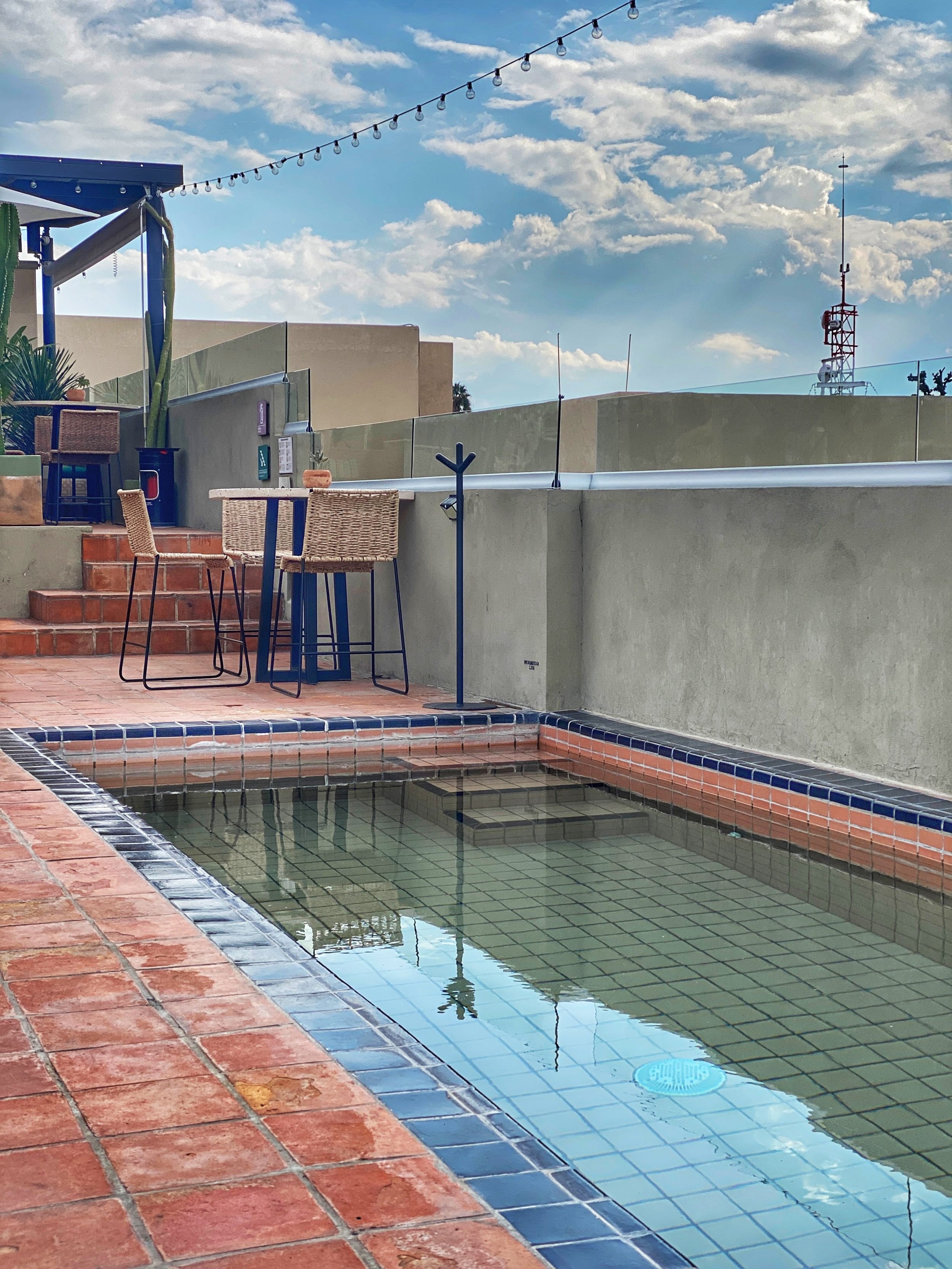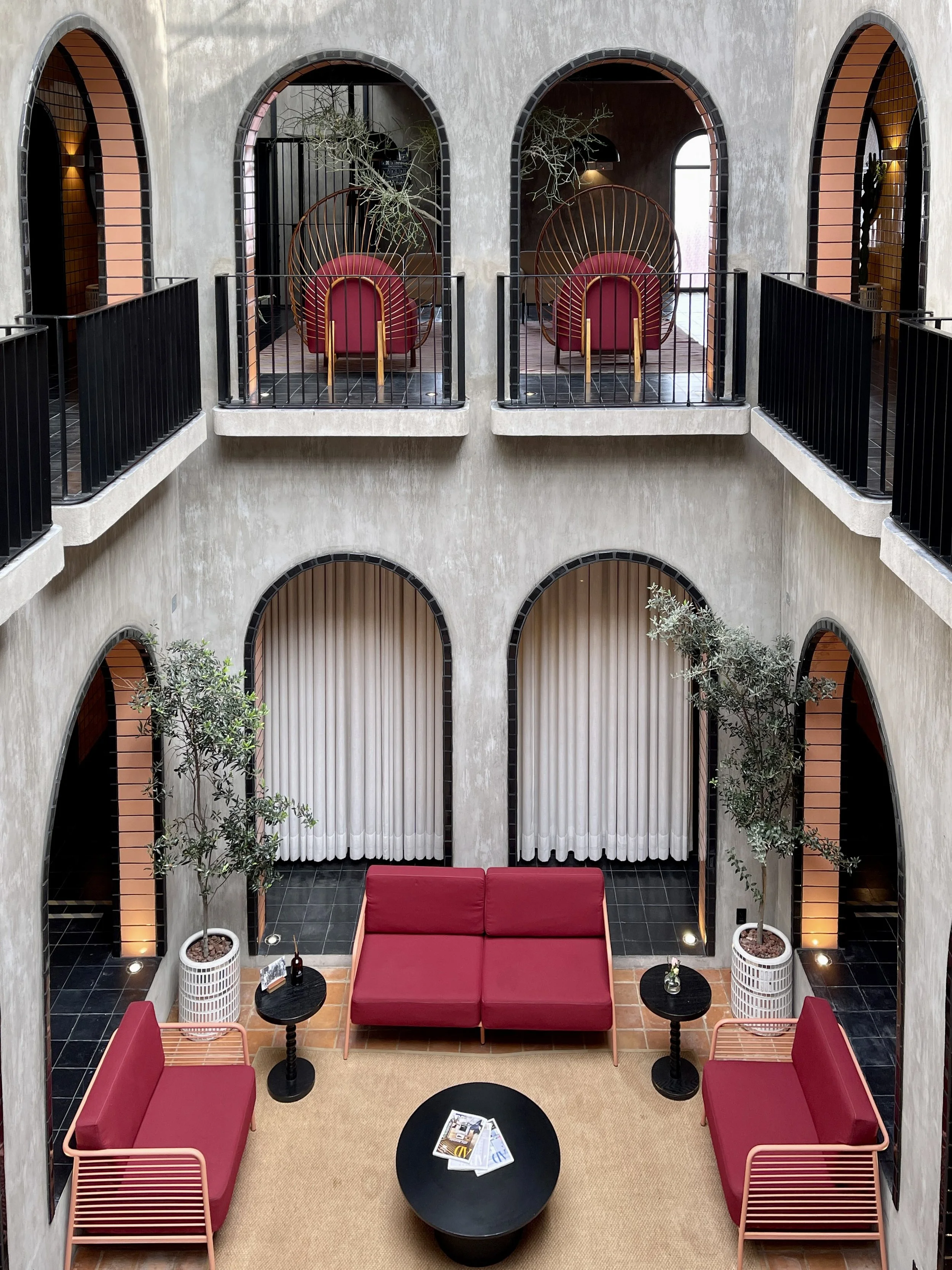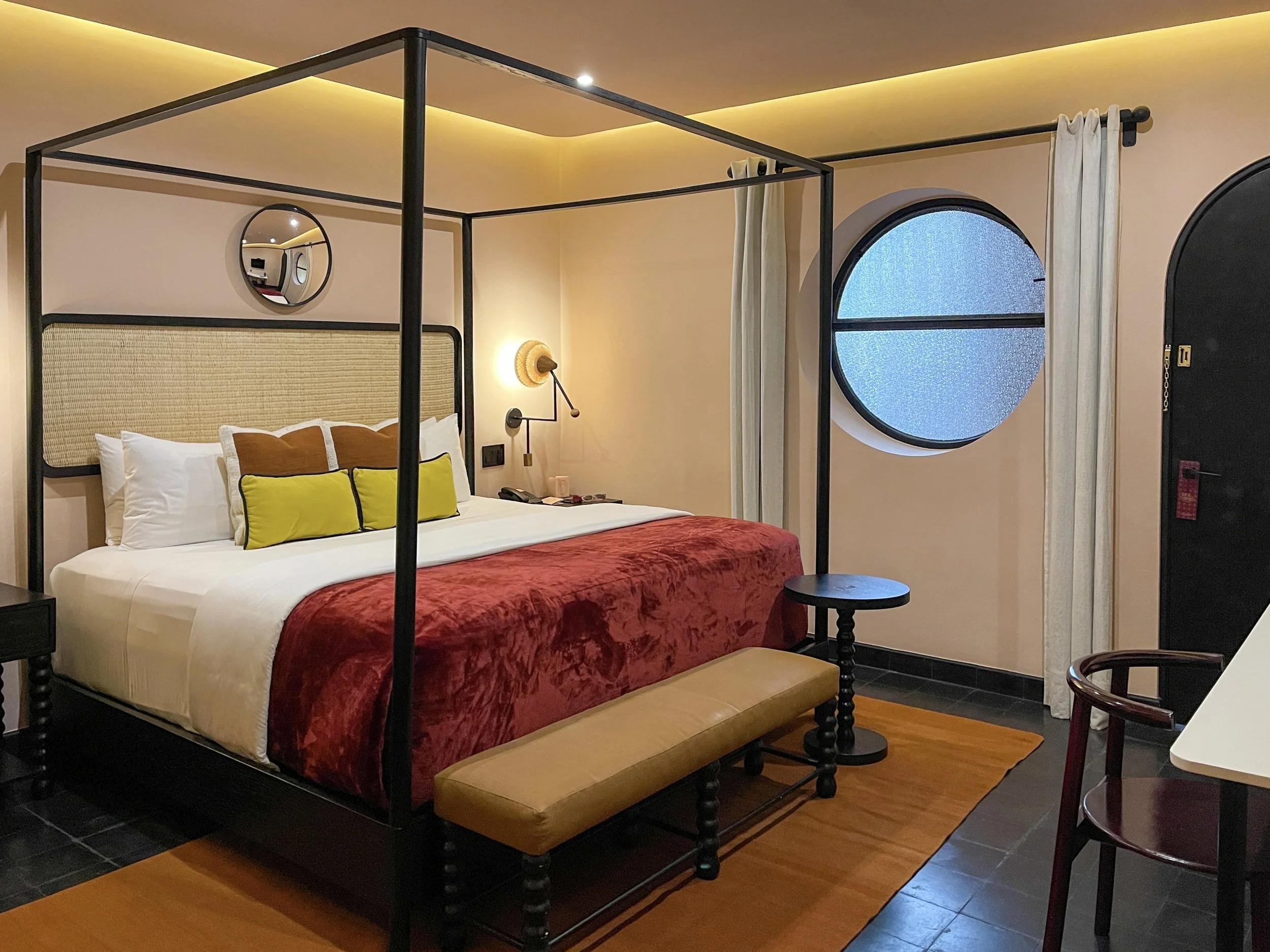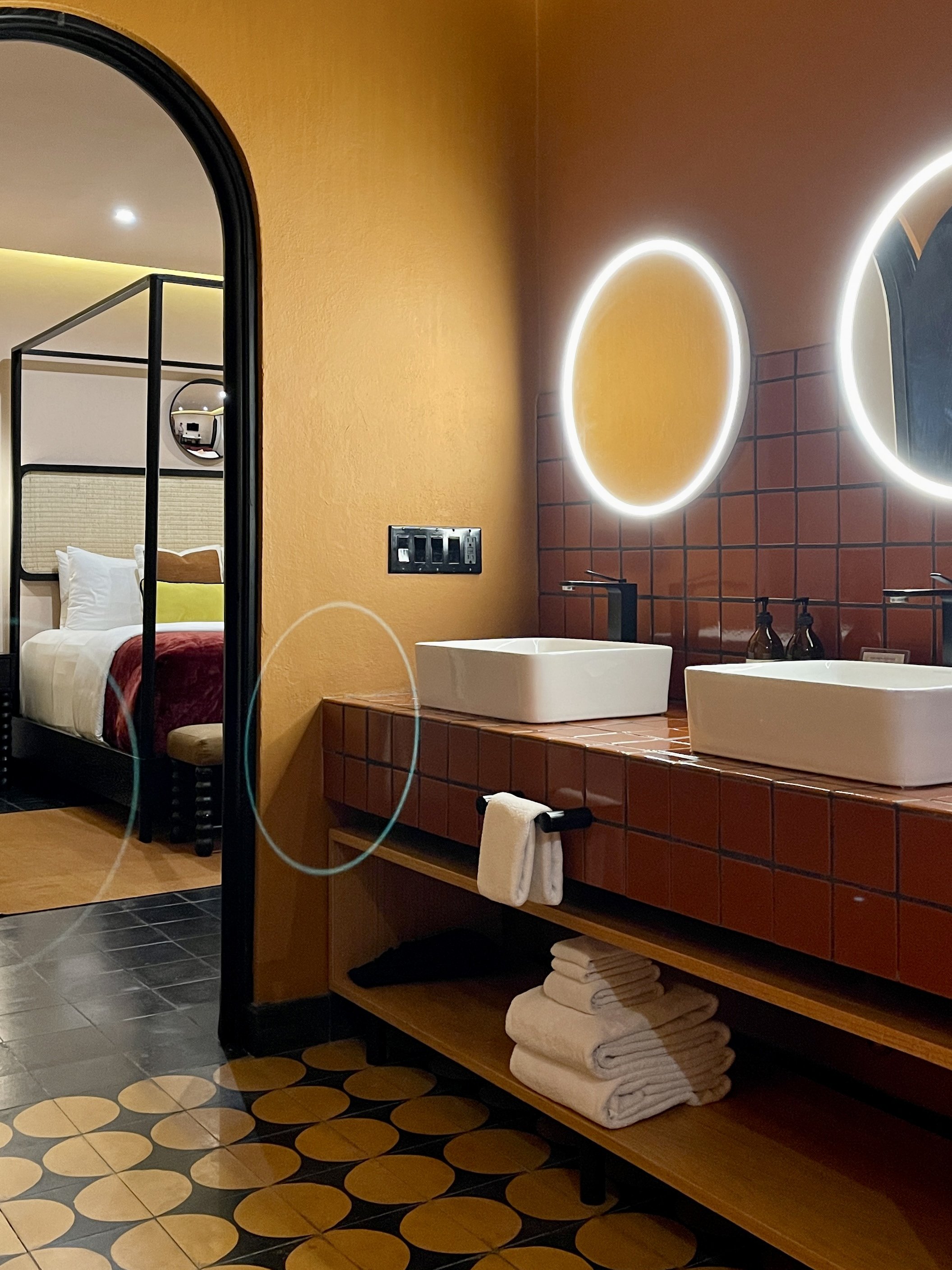With so many places to stay in San Miguel de Allende, you could make your base the cinematic Casa Hoyos, which pays a stylish homage to its storied past, hosts the trendy rooftop bar Bekeb and is within walking distance of the major sites of this charming Colonial city.
Bright colors and a Deco-meets-Modern design make Casa Hoyos feel like something out of an Almodóvar film. Those eclectic throne-like armchairs come from the Mexico City design studio Comité de Proyectos.
The building that stands at Mesones 14 in San Miguel de Allende has a colorful past dating back to the 17th century. It’s now Casa Hoyos (the last part is pronounced “Oy-ohz”), a boutique hotel that pays homage to its origins. The property was acquired by Julián Hoyos in 1938 to house both his family and his business. It was here that he established a grain and seed bank. In 1947 he added the city’s first cambio de moneda, or currency exchange, to serve the arriving expats. It operated until the mid-60s. Locals affectionately gave the property the nickname “Banco del Frijol” or “the Bean Bank.”
The home has belonged to the same family for four generations, and under the supervision of Julián’s great-granddaughter and hotel founder, Vianney Torres, reemerged in 2020 as Casa Hoyos.
Wally hangs out in the swinging chair in the hotel’s front courtyard.
Staying Power
In November 2018 Wally and I stayed at the Ignacia Guest House in the pedestrian-friendly Colonia Roma neighborhood of Mexico City. The accommodations were a collaboration between architecture firm Factor Eficiencia and Andrés Guitiérrez’s interior design firm A-G Studio. I loved the mix of traditional and contemporary style, not to mention the curation of handmade artisan pieces found throughout the former manor, a love letter to its beloved housekeeper Ignacia, who lived and worked at the house for more than 70 years.
I’ll admit it, I’m a fan of Guitiérrez’s. When the time came for us to find the perfect place to stay in San Miguel de Allende, and I saw that Casa Hoyos was another one of his projects, the decision for me was easy.
If you visit in the warm season, you can cool off in the rooftop pool.
Because the original home is a historic property, every detail of its restoration was regulated and submitted for approval to the National Institute of Anthropology and History (INAH). UNESCO also oversaw aspects of the renovation, as the town center was designated a World Heritage Site in 2008.
When it came to selecting color for the façade, INAH requires that all buildings in San Miguel de Allende abide by specific standards–in this case, a particular palette of burnt red, orange and yellow. The hotel’s exterior is covered in a rich red ochre called vasija.
Circular porthole-like interior windows create fun viewing (and photo) frames.
Rebuilt to Last
One afternoon we met up with Enrique Garcia, the hotel’s director of operations and marketing, outside the hotel office, which was the original location of the kitchen. I was admiring the well-worn pink stone of the courtyard beneath our feet. Enrique told us that each of these stones was quarried in the hills outside of San Miguel de Allende and, because of UNESCO oversight, required precise documentation and numbering before they could be removed and put back exactly into place.
Standing outside the office is a beautiful Moorish-looking structure with niches that now hold candles. When I asked Enrique about it, he smiled and told us that it was known as an aguamanil and was used for placing hot clay pots to cool after they were removed from the stove.
This piece, called an aguamanil, stood right outside the family’s kitchen and was a place to put hot pots for serving.
The courtyard also contains the hotel’s kitchen and breakfast area, which is currently run by As de Guia, as well as a couple of other businesses: Tropa Gallery and Neithan Herbert, a women’s clothing boutique.
Breakfast from As de Guia consists of fruit, yogurt, granola, toast and coffee.
The light complimentary breakfast consisted of fresh fruit, including cantaloupe, apples and papaya, served with a dollop of yogurt and granola, along with coffee, toast and freshly squeezed orange. if you’d like something heartier, you have to order from their à la carte menu.
Looking down at the back lobby with its bright red couches
Like Being on the Set of an Almodóvar Film
The boutique hotel was built in the second courtyard, where grain warehouses once stood. But the real visual wonder comes when you walk through the passageway leading from the courtyard to the reception counter. The remains of an original brick wall give way to lofted wooden beams and a modern aesthetic — a striking contrast to the Colonial-style buildings just outside its wooden doors. Rooms range from singles, doubles, junior suite and master suite.
I looked around and remarked to Wally that I felt like I was in an Almodóvar film. The objects and colors of his sets evoke an exuberant mood, much in the same way that Guitiérrez uses color.
See you around, Wally!
Circling back with you Duke.
Informed by an exchange of ideas with Torres about the home’s history, Guitiérrez and his creative director, Mayela Ruiz, designed a pared-back atrium that forms the center of the space. A hybrid of ’50s Mexican Modernist and ’20s Art Deco, its walls are enveloped in raw concrete — a stark contrast to the graphic pop of glazed yellow ochre tiles and black grout revealed through the curved openings of the surrounding arcade. Andalusian-style balconies typical of a Spanish home complete the design, a reference to patriarch Julián, who moved to San Miguel de Allende from Spain during the Mexican Revolution.
The tilework Virgin of Loreto looks down (and keeps an eye on?) the honesty bar on the first floor.
During the day, sunlight fills the lobby with a warm glow and features a trio of ’50s-inspired salmon pink Felix sofas with red cushions, a collaboration between industrial designer Christian Vivanco and Monterrey, Mexico-based manufacturer Los Patrones. The unattended honesty bar is stocked with a selection of artisanal mezcals, tequilas and whiskey.
Observing the scene from her second-story perch is the Virgin of Loreto, the patron saint of the Hoyos family and nearby Templo del Oratorio de San Felipe Neri. The hand-painted tile mural was sourced from the town of Dolores Hidalgo, which like Puebla, specializes in tin-enameled Talavera pottery. I didn’t manage to get a good photo of it, but the piece below the Virgin was repurposed and originally served as the exchange house counter. The understated encaustic black cement floors anchor the space and draw the eye up to the tiled walls, the color of maize, a wink to its former life as a grain and seed warehouse.
Welcome to Casa Hoyos! Concierge extraordinaire Christopher can help you organize outings.
Additional references to the Hoyos family can be found in the hotel’s logo, a pair of serpents from the heraldic family coat of arms, echoed in the details of the arcades’ pale pink and black tile-edged arches and its rounded Deco elements, such as interior windows and lobby portholes.
The bed in the master suite
Home, Suite Home
Alex, a porter at the hotel, met us upon our arrival and whisked our luggage up to our room.
We stayed in room 12, the master suite, which was outfitted with a king-size four-poster bed and black and natural woven rattan pieces designed by A-G Studio. The walls and ceiling are covered in a soothing shade of pastel pink.
Adding to the vibe was a squat gunmetal table lamp by Editora Nacional sitting atop a console with spiral turned legs, one of the aforementioned pieces designed by A-G Studio. On the wall above this hangs a wool tapestry designed by Mexican artist Meli Ávila.
The LED light rings in the bathroom help put you in your best light.
The bathroom has burnt orange walls, recessed ceiling lighting, a jacuzzi tub big enough for four people and a rain shower. On our first evening there, Wally indulged in a luxurious bath and emerged entirely relaxed. As a bonus, there are two sinks, a pair of circular mirrors with LED lighting rings and botanical body care products by Loredana.
A fun neon sign on the rooftop terrace
Raising the Bar
On the rooftop terrace of Casa Hoyos is Bekeb, led by master mixologist and owner Fabiola Padilla, who previously honed her skills at Cosme and Diego in New York City. Its name is a palindrome and refers to the Tzontil word bek, which means “seed.”
Bekeb cocktail bar becomes quite the hotspot on weekend nights.
The thread connecting each cocktail is that they’re all based on roots, plants and flowers. Padilla pairs endemic herbs such as hoja santa and cedrón to infuse traditional Mexican spirits such as mezcal, sotol and racilla.
The gorgeous view from the rooftop at Casa Hoyos. Here you can see nearby Plaza de la Soledad — along with three of the many churches in town.
Two of Bekeb’s signature cocktails: the Carijillo Allende and the Guava Tiki
Fresh herbs used in cocktails are kept in skull containers at Bekeb.
On our first visit, I tried the signature Bekeb cocktail, which was served in a cool handmade earthenware tumbler, and Wally tried the Milk Punch Vol. 2. I also tried the Carijillo Allende, and Wally the Guava Tiki on the evening before we left. The Carijillo consisted of espresso, cacao liqueur and banana liqueur, garnished with star anise. It was the perfect drink to imbibe as we watched the sun set behind the tiled domes of the Iglesia de San Francisco.
If you’re looking for something to eat before dinner there’s a tapas menu, and a DJ spins on the weekends, when the bar becomes a trendy hangout.
Wally and Duke relaxed on the rooftop terrace after a long day exploring the quaint town of San Miguel de Allende.
Home Base
We loved calling Casa Hoyos home. We’ll not soon forget the kindness of the hotel’s chief concierge, Christopher Granados, who took the stress out of coordinating our visit to the Chapel of Jimmy Ray in Cieneguita and a day trip to Guanajuato.
Its prime location in the heart of the city made it easy for us to set out for the day to explore its sights. It’s a short walk along the cobblestone streets to the lively Jardín de Allende and the spectacular Neo-Gothic Parroquia de San Miguel Arcángel, the city’s main parish church. –Duke
Casa Hoyos
Mesones 14
Zona Centro
37700 San Miguel de Allende
Guanajuato
Mexico









































